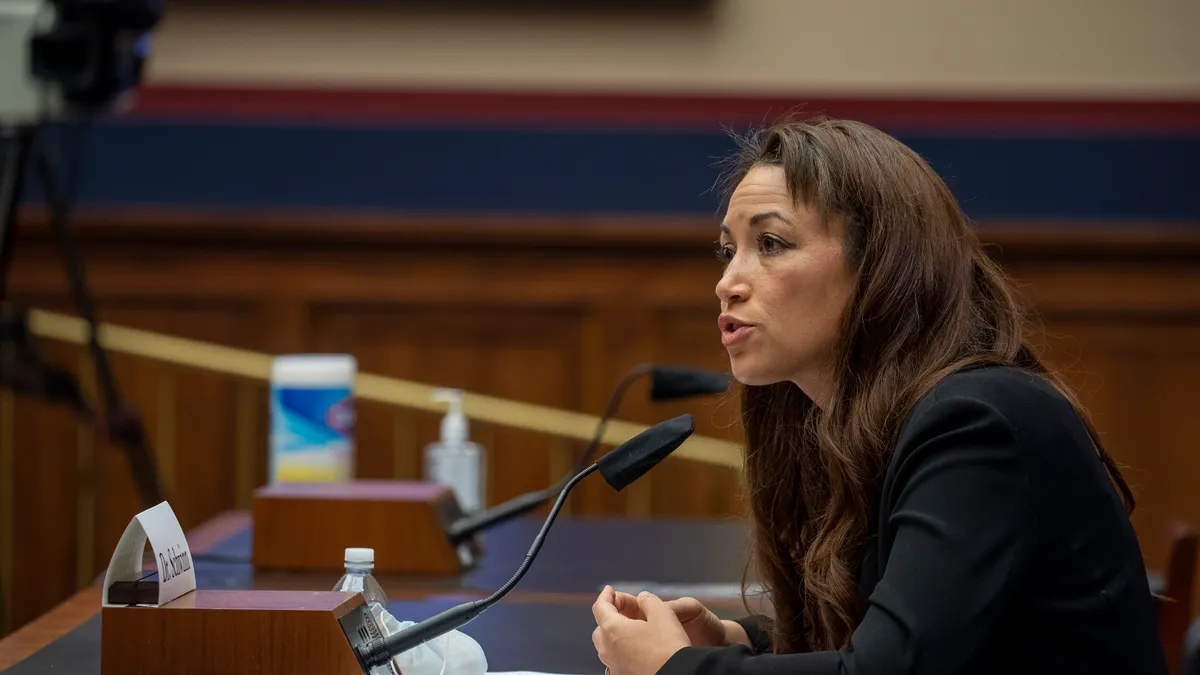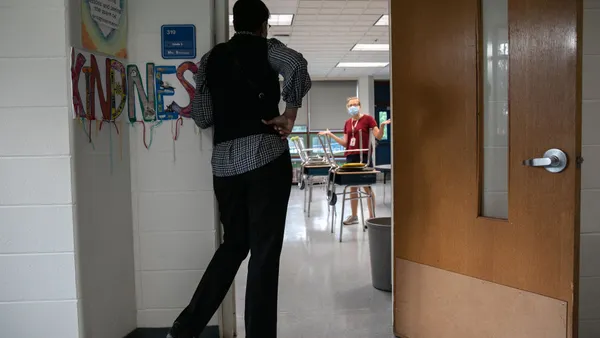Dive Brief:
- Penny Schwinn will step down as Tennessee education commissioner at the end of the school year, a post she has held since January 2019.
- Lizzette Gonzalez Reynolds will take Schwinn’s place at the department, effective July 1, Gov. Bill Lee announced Monday. Reynolds is currently vice president of policy for ExcelinEd, a nonprofit that supports education reform policies including school choice.
- Over her more than four-year term, Schwinn has made sweeping changes to the education landscape in Tennessee, from implementing a statewide Education Savings Account program to helping create the first teaching apprenticeship program.
Dive Insight:
Schwinn's statewide initiatives have cast her in the national spotlight. She shepherded in efforts to scale up high-dosage tutoring and to focus on phonics and high-quality literacy instructional materials. She also established Tennessee as the first state with a federally recognized registered teaching apprenticeship program — a model now being replicated across the country.
Her latest push for phonics-based instruction had already led to English assessment results that match or exceed prepandemic levels, Schwinn said in September 2022 during a U.S. House subcommittee hearing.
“Commissioner Schwinn has been an incredible advocate for the students of Tennessee for more than four years, always keeping them at the center of her work as she implemented a new funding formula, high-quality literacy standards, a high-dosage tutoring initiative and other programs to help all students recover from the pandemic and set them on the path to success in college and careers,” said Carissa Moffat Miller, CEO of the Council of Chief State School Officers. Schwinn also has served on CCSSO’s board of directors.
Lee also shared his “tremendous gratitude” for Schwinn’s leadership.
“During her years of dedicated service, Penny has played a key role in our administration’s work to ensure educational opportunity for Tennessee students and secure the next generation of teachers, while navigating historic learning challenges,” Lee said.
However, some in Tennessee expressed less praise for Schwinn.
Following her resignation announcement, state House Democratic Caucus Chairman John Ray Clemmons said her tenure will be defined by efforts to “undermine the integrity” of public schools, The Tennessean reported. As evidence, Clemmons specifically pointed to policies such as the Education Savings Account program, charter school expansion, significant changes to the state’s K-12 funding formula and a new 3rd grade retention policy.
“Perhaps no administration has done more to harm our schools and students and strategically undermine teachers than Schwinn and Lee," Clemmons said. "Once we finally get rid of Lee and hopefully elect someone who truly values public education, it will take years to undo the damage these two have intentionally caused to Tennessee’s public education system.”
Some Tennessee legislators and educators don’t feel like Schwinn listened to them throughout most of her tenure, said JC Bowman, executive director of the Professional Educators of Tennessee, a teacher association based in Nashville.
“There’s a real huge disconnect between the legislature and her, and we are caught somewhere in the middle,” Bowman said.
Bowman does agree that Schwinn’s effort to establish a teacher apprenticeship program was a good decision, but it will not be the only solution to recruiting more teachers, he said. The legislature will also likely have to revisit her education funding reforms, which Bowman said felt rushed.
But ultimately, he said, Schwinn’s legacy in Tennessee will be determined by her literacy initiatives and the outcome of state reading scores within the next two or three years.
“I actually think our literacy will improve. I think there are enough people that bought into it,” Bowman said. “The next commissioner that comes in, they’re going to have to pick up the math piece, as well.”
Before Schwinn arrived in Tennessee, she served as the chief deputy commissioner for the Texas Education Agency for three years and, prior to that, as the chief accountability and performance officer at the Delaware Department of Education.
Although Schwinn hasn’t indicated what she will do next, she said she won’t be leaving the state, according to The Tennessean.












